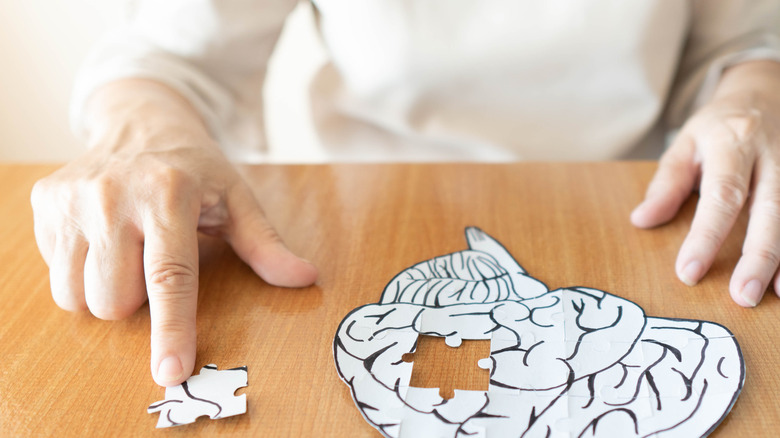How A Basic Memory Test Could Be A Game Changer For Alzheimer's Detection
While experts still don't know what exactly causes Alzheimer's disease, they know that certain factors play a part. Two areas of study focus on the role of certain proteins and plaques in the brain. Mayo Clinic reports that tau proteins deliver nutrients to the brain, and in Alzheimer's patients, these proteins become tangled, disrupting that process. Another point of interest is beta-amyloid plaque, which is the result of larger pieces of protein clustering together in the brain, which interrupts how cells communicate with each other.
The University of California San Francisco explains that positron emission tomography (PET) scans can help detect amyloid plaques in the brain, and research from Washington University School of Medicine in St. Louis gives hope that a blood test might be able to do so as well. Now, a new 2022 study indicates that it might be possible to detect early signs of Alzheimer's disease with an easy memory test, according to a study published in the journal Neurology.
The test involves remembering pictures
The data involved more than 4,400 people with an average age of 71.3 who did not show any signs of cognitive decline (via Neurology). The participants were shown pictures and given clues to help them remember what was in the picture. They were later asked to recall what was in the image. They were placed into five groups based on how easily they could recall the picture, including whether they needed help with a clue. Those who had difficulty remembering the picture, with and without the clue, had higher levels of beta-amyloid plaque, according to Healthline.
The results might help predict the early stages of dementia and Alzheimer's Disease by as much as five to eight years and advanced stages of the disease by one to three years. Dr. Ellen Grober, author of the study and researcher at Albert Einstein College of Medicine in New York, said that this memory test could possibly replace expensive scans and lumbar punctures when it comes to identifying early markers of Alzheimer's Disease (via Healthline).


